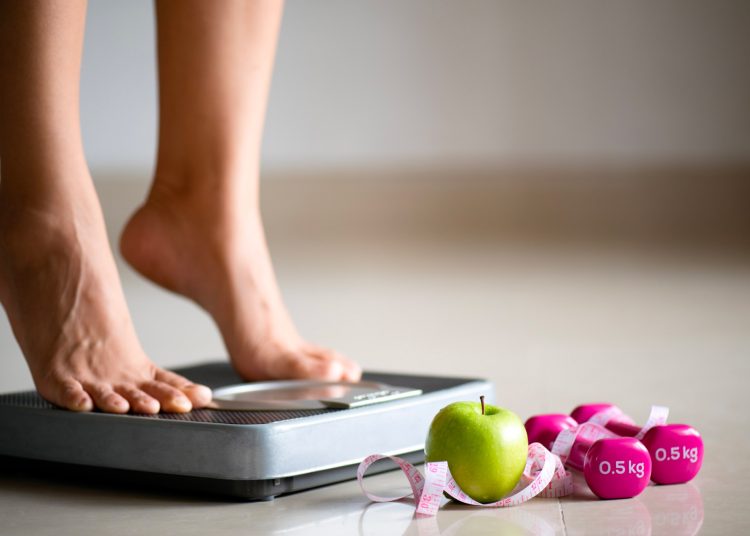The first time I tried checking my weight at different times of the day, I felt restless as it seemed erratic. This encouraged me to delve deeper into understanding whether fluctuating weight is a normal phenomenon or something I should be concerned about.
After reading several scientific research papers, I learned that your body weight can fluctuate anywhere between 4-6 pounds (2-3 kilograms) throughout the day. This is normal and is influenced by factors like food intake, hydration, exercise, and even your sleep patterns.
In this article, I go over why body weight fluctuates throughout the day, the reasons behind daily weight fluctuation, and how to manage your weight.
Why Does Weight Fluctuate Daily, and Is it Normal?
If you are experiencing slight changes in your weight each day, consider it normal. That’s because you don’t eat or drink the same kind or quantity of food daily.
Some kinds of food, especially salty food, can cause fluid retention and bloating, pushing the digits on your weight scale slightly higher than usual. Similarly, improper bowel movements can also affect your overall weight. A large bowel movement may also slightly decrease your weight post-bathroom use.
Factors Causing Body Weight Fluctuations
Common factors contributing to daily weight fluctuations may include the following:
Hydration Levels
A human adult body consists of 60% water, which plays a significant role in the overall body weight. Whether you’re following a regular diet or a fasting regimen, you can still drink water throughout the day. Moreover, the amount of water you consume at different points in the day may also vary. This can impact the body’s water content, resulting in possible weight fluctuations.
While drinking a large amount of water in a single sitting may cause a slight weight increase, it is important to understand that the weight gain isn’t permanent. Passing out water in the form of urine can help shed this temporary weight. One of the positive facets of optimal hydration is that it can assist in your weight loss goals in the long term. (1)
On the contrary, studies reveal that dehydration can cause weight gain. (2)
Food
The weight of food itself can contribute to your overall body weight. The food you consume also comprises water, which can cause your weight to increase. Some water may be retained by the body to aid in digestion.
However, not all that you eat sits as fat in your body. While some calories consumed via food are used by your body to fuel bodily functions, some calories may be stored for future use. Also, some of the food is excreted from the body through urine and stool.
Sodium Intake
Water retention can cause body weight fluctuation. Consuming high-sodium foods can lead to an increase in body weight. If your body is sensitive to sodium, it may retain more water than individuals with lesser sensitivity to salty foods.
Sodium isn’t solely found in table salt; it’s often hidden in various forms in packaged and frozen foods. Next time you pick up a low-calorie soup from the supermarket, don’t forget to check its label, as you may be surprised to discover its high sodium content.
Sometimes, replacing a big homecooked meal with a low-calorie soup might show an increase in your weight. However, this weight could be due to water retention caused by high sodium in your low-calorie soup.
Read also healthiest salt revealed.
Carbohydrate Consumption
If you’re wondering why and how carbohydrates could contribute to daily weight fluctuations, here’s what you may need to know.
Carbohydrates from rice, bread, and other starchy carbs are stored as glycogen in your body. Every gram of glycogen adds at least 3 grams of water to your body. Hence, a high carbohydrate meal can contribute to a noticeable weight gain. (3)
Try our carbohydrate intake calculator.
Exercising
Exercise can lead to daily body weight fluctuations. Working out induces sweating, which aids in the regulation of body temperature through heat dissipation. Sweating can lead to loss of water weight. Prolonged exercise can lead to both water and electrolyte loss. The rate of sweating depends on several factors and is likely to rise in proportion to the work rate and other environmental factors. (4)
However, fluids lost during exercise should be replaced to prevent dehydration. While consuming electrolyte supplements can help replenish your body, the combination of exercising and rehydrating may result in weight fluctuations.
Taking Medicines
Some medications can cause weight gain. This could be due to an increased appetite or water retention. Individuals on medication to treat health conditions such as high blood pressure, diabetes, or seizures may observe weight fluctuations.
Steroid hormones, non-steroidal anti-inflammatory medicines, and antihypertensive drugs can cause salt and water retention in the body, causing slight weight changes. (5)
Similarly, anti-inflammatory drugs, opiates, and many other medicines can cause weight loss. However, substantial weight changes are usually seen only with the use of medication.

Menstrual Weight
If you are a woman on your menstrual cycle, it isn’t unusual to experience some degree of bloating right before and after a period. This happens due to the retention of fluid that typically peaks on the first day of the menstrual cycle and touches its lowest during the middle phase of the cycle.
Also, around ovulation, your body increases fluid retention. A study indicated an approximate 0.5-kilogram weight gain from cellular fluid retention is common during the menstrual cycle. (6)
Alcoholic Beverages
If you are heading to a party or have invited your friends for drinks, you can check your weight before and after consuming alcohol.
When you consume alcohol, you might notice an instant reduction in your weight, as drinking may result in the production of more urine than usual.
A study revealed that drinking alcohol could produce urine flow within 20 minutes of alcohol consumption. This could result in fluid loss via urine, increasing the concentration of electrolytes in blood serum. Such changes could also cause dehydration. (7)
As already discussed, dehydration can cause weight fluctuation.
Managing Fluctuating Weight
Losing weight can appear more difficult than gaining it. However, in a healthy body, a holistic approach can help you maintain a nearly uniform weight throughout the day with minimal fluctuations.
Despite maintaining a consistent and balanced diet, weight can still fluctuate throughout the day. Every food item or beverage you consume has some weight, even though it might appear negligible. Just like drinking water can add to your weight, so can vegetables, fruits, and other ingredients.
Consuming simple, nutritious meals and ensuring proper hydration can facilitate the efficient passage of food and water through your body, thus minimizing significant daily weight fluctuations. Food items high in sodium, carbohydrates, and unhealthy fats can take longer for the body to process and be eliminated as waste.
It is equally important to know when to weigh yourself. Your lowest weight during the day will most likely be right after you hop out of your bed in the morning and empty your bladder.
You can follow this practice of weighing yourself at a certain time for a few days on the same scale to find an accurate measurement. You can repeat the same process of noting your weight during mid-day and at night before slipping into bed. This should give you a fair idea of how much your weight fluctuates daily.
Things To Consider When Weighing Yourself

When it comes to tracking your weight, ensuring accuracy is key. Here are some essential tips to keep in mind when weighing yourself.
Use The Right Equipment For Weighing Yourself
You can run a quick market survey or check user reviews to purchase a dependable weighing machine. Digital scales are considered more accurate.
Use the Scales Appropriately
It is important to place the scales on a firm and level floor. Stand on it only when the scales display zero. You should stand with your feet together in the center of the equipment and record your weight to the nearest decimal point as indicated on a digital scale. You can check the user manual for further details of your chosen scales.
Consistently using the same weighing scales can help you track weight changes accurately.
Remove Clothing
Keep clothing as minimal as possible, and keep your hands free when weighing yourself. Take off your shoes before mounting the scale.
If you’re interested in natural weight loss methods, exploring sustainable fasting plans can help you achieve your objectives. Intermittent fasting, water fasting, and keto OMAD are some popular fasting methods that you can check out. Also, the Mediterranean, paleo, low-carb, and ketogenic diets have been making some noise across weight loss forums.
FAQs
Can I lose 2-3 pounds in a day?
Yes, you can lose 2-3 pounds in a day, although the lost pounds may not necessarily be due to fat loss. Instead, it is most likely water weight. You should weigh yourself over a few days to check consistency in weight loss before determining whether it is from water or actual fat.
Losing 2-3 pounds of actual fat in a single day is not healthy or sustainable. The CDC recommends aiming for a safe and gradual weight loss of 1-2 pounds per week. Rapid weight loss can lead to muscle loss, nutrient deficiencies, and other health issues. Focus on creating a calorie deficit through a balanced diet and regular exercise for long-term success.
What is the best time to weigh yourself?
One of the best times to weigh yourself is in the morning, after using the loo. You must check your weight at roughly the same time of the day once weekly.
Checking your weight first thing in the morning can give a better estimate as it will not be affected by any physical activity. Also, it is likely to be several hours since your last meal. Eating can alter your weight, so taking your weight in a fasted state is recommended.
Summing it Up!
As discussed, minor fluctuations in body weight recorded at various times throughout the day, irrespective of your diet, are considered normal. A variation of up to 6.6 pounds (3 kilograms) is acceptable, depending on your body weight. Also, a study cited that fluctuations in weight between weekdays and weekends could be considered normal and not a sign of weight gain. (8)
If you are on a weight loss journey, I’d recommend you track your weight trends over an extended period rather than focusing on how much you weigh each day.
If you see drastic or unwanted variations in your weight daily, you must consult a healthcare professional. Moreover, consider using reliable weighing equipment and stick to the same scales for accuracy.
References:
- Thornton, S. N. (2016, June 10). Increased Hydration Can Be Associated with Weight Loss. Frontiers in Nutrition.
- [Effect of prolonged water deprivation on weight gain and water metabolism in a gerbillid rodent (Meriones shawl shawi)]. (1987). PubMed.
- Murray, B., & Rosenbloom, C. (2018, February 10). Fundamentals of glycogen metabolism for coaches and athletes. Nutrition Reviews.
- Fluid balance and exercise performance. (2003, March 1). PubMed.
- Dendorfer, U., & Mann, J. F. (2006, November 1). Volumen- und Elektrolytstörungen bei medikamentöser Therapie. Der Internist.
- Kanellakis, S., Skoufas, E., Simitsopoulou, E., Migdanis, A., Migdanis, I., Prelorentzou, T., Louka, A., Moschonis, G., Bountouvi, E., & Androutsos, O. (2023, July 3). Changes in body weight and body composition during the menstrual cycle. American Journal of Human Biology.
- Epstein, M. (1997). Alcohol’s Impact on Kidney Function. PubMed Central (PMC).
- Orsama, A.-L. et al. (2014) ‘Weight Rhythms: Weight Increases during Weekends and Decreases during Weekdays,’ Obesity Facts, 7(1), pp. 36–47. Available at: https://doi.org/10.1159/000356147.
Article Updates Timeline:
Our editorial team experts constantly update the articles with new information & research, ensuring you always have access to the latest and most reliable information.
February 26, 2024
Written By
Dr. Rashmi Byakodi
Edited By
Vidur Saini
Fact Checked By
Dr. Malik











